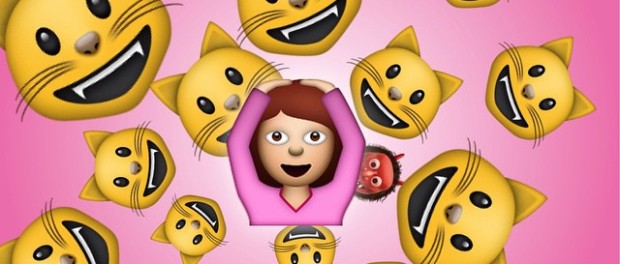Disconnected Emoticons with Emojigirl
Who hasn’t spent a day limiting one’s connection to the virtual, refusing to interact except via facebook, twitter, gchat? It can be so liberating to make new friends around the world without getting out of one’s pyjamas through blog posts, tweets, comments, and all manner of internet communication. Of course, it’s liberating until it becomes a trap of checking stats that don’t grow exponentially, waiting for responses that never come, and finding oneself shouting into the darkness for attention. Emojigirl, the new production by Doubl/e/space looks at this brave new world of online connection. I spoke to playwright and director Michele Robinson about the meaning of the show.
Robinson says she created the show in response to how she felt about her online persona. “I got interested in how social media was making me feel. It’s a new zombie apocalypse, getting absorbed in your cell phone screen, alone but together in your cell phone space,” she says. In a desire to make something that was both funny and artistic, she created the show. “It’s about that crazy Emojigirl inside everyone that creates the iPhone obsession or that obsession to check your social media and see what messages are waiting for you in the cyber world.”
Robinson especially is interested in the oxymoronic relationship between connection and disconnect. “I get the sense that loneliness is on the rise, while opportunity for connection is also on the rise,” she says. She notes how the results can be dispiriting. “Comparison culture is all over the piece. Open up your instagram and you see the lives of others and all the things you don’t have. You see your life for what it isn’t. That can create some shitty feelings.”
In the multimedia, one-woman play, Emojigirl, a social media drama queen, journeys through self-awareness. She is obsessed with connection, addicted to her online self. “She is living the social media life, searching for more connections, observing more people’s stuff,” says Robinson. Soon, though she begins to experience cracks. The play shows her interrupted by texts and notifications she doesn’t want, including ex-lovers. She struggles with sex and “not knowing how to use her real body.” In sum, Robinson says, “She is a queen in social media, but a loser in real life.”
As with several other Doubl/e/ space productions, the piece is atypical. “The story is not a plot like a fairy tale or a novel or a normal play,” says Robinson. “We go through different hash tags. We label contemporary experience with these hash tags. We move through these clips, these snaps of experience. The piece is structured after social media apps, the disjointed experience of notifications, and tweets. It’s not a linear plot.”
I asked Robinson why she decided to write this play. “The whole concept came from my real feelings,” she says. “I didn’t get enough likes on a photo I thought would be popular and then I go into any café, and there are two people on a date and they’re on Tinder while talking to each other.”
Even more so, she says that her scholarly interest in feelings played a role. “My interest in school and my studies is feelings. I really connected with a particular feeling of a lack of self-love and seeking validation from others online. I thought to make a show about it as a way to reach people who have something to say about these feelings as well.”
One very interesting thing about Emojigirl is that Robinson was able to create an online persona for the character, using the emoticon of the girl in a pink sweater with her hand up on the iPhone. She can be found on Tinder, instagram, snapchat, facebook, and twitter (@_emojigirl). Robinson let Emojigirl interact with others through all these platforms.
“The Tinder has been the most interesting,” she says. “She’s found some flirtations. She only speaks in emojis. People are really into her. She’s hot. People are into her.”
Keeping the online Emojigirl alive was a “timesink,” says Robinson. She couldn’t keep up with the online all-the-time lifestyle. When the play is done again, Robinson says, “We’ll have a team of people on each account.”
Emojigirl runs from April 22, 23, 24, and April 29, 30 and May 1 at Morrice Hall Theatre (McGill campus). 8 p.m. See here for tickets. $15/9.









